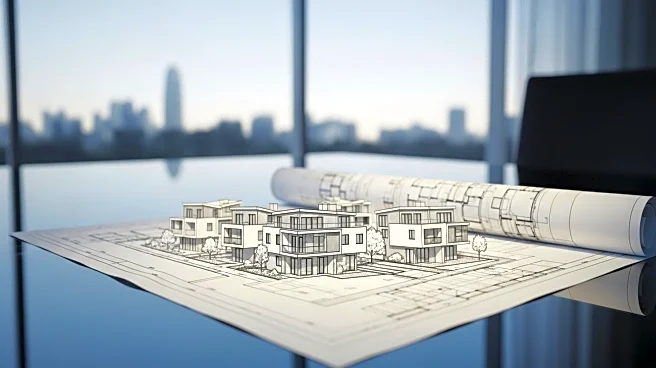What's Happening?
Governor Gavin Newsom has signed Senate Bill 79 into law, which aims to expedite the construction of affordable housing in California's largest metropolitan areas. The bill allows for the development of homes and apartment buildings up to six stories tall near transit stops, overriding local restrictions in single-family zones. This initiative is part of the 'Yes, in my backyard' movement, intended to provide affordable housing options close to jobs and schools. However, Los Angeles city and county officials, including Mayor Karen Bass, have opposed the bill, arguing it undermines local planning and community input. The Los Angeles City Council passed a resolution against SB 79, citing concerns about the impact on single-family neighborhoods and infrastructure.
Why It's Important?
The passage of SB 79 is significant as it addresses California's ongoing housing crisis by promoting the development of affordable housing near transit hubs. This could potentially reduce commute times and costs for working-class residents, enhancing their quality of life. However, the opposition from Los Angeles leaders highlights a tension between state-level initiatives and local governance. Critics argue that the bill could lead to overdevelopment and strain existing infrastructure, while supporters believe it is a necessary step to meet housing demands. The outcome of this legislative action could set a precedent for future housing policies in California and influence similar debates in other states.
What's Next?
Los Angeles city officials are expected to pursue legal action to prevent SB 79 from taking effect. This could lead to a prolonged legal battle over the balance of power between state and local authorities in urban planning. The response from other cities and counties in California will be crucial in determining the bill's impact statewide. Additionally, the implementation of SB 79 will require careful monitoring to assess its effects on housing affordability, community dynamics, and infrastructure development.
Beyond the Headlines
The controversy surrounding SB 79 raises broader questions about urban development and the role of government in shaping city landscapes. The bill's focus on transit-oriented development reflects a shift towards sustainable urban planning, but it also challenges traditional notions of neighborhood identity and autonomy. The debate may influence future discussions on how to balance growth with community preservation, especially in cities facing similar housing shortages.











